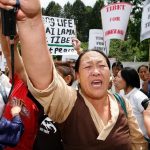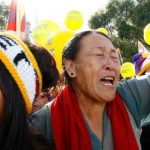60 Years of Resisting Occupation: The Australia Tibet Council’s Kyinzom Dhongdue

Currently, Chinese authorities have placed restrictions on foreigners entering occupied Tibet. Commencing on 30 January, the ban on foreigners, which will continue for sixty days, was put in place as a politically sensitive date that holds significance for the locals is about to transpire.
This coming Sunday marks the 60th anniversary of the Tibetan Uprising. On 10 March 1959, almost a decade after the Chinese Communist Party (CCP) began its invasion of Tibet, 300,000 Tibetans surrounded the Potala Palace in the capital Lhasa to protest the Chinese occupation of their nation.
The Chinese troops brutally suppressed the Tibetan act of resistance. Tens of thousands of the protesters lost their lives. And this led the spiritual leader of Tibet, the Dalai Lama, to flee the country. And a mass exodus of about 85,000 Tibetans followed.
Chinese authorities are also monitoring Tibetan pilgrims journeying to Lhasa at present from other regions. On arrival in the capital, the pilgrims are interrogated. And many of them have chosen to return home for fear of being falsely accused of taking part in any protests that may take place.
The erasure of language
Tashi Wangchuk was convicted of inciting separatism in May last year. Sentenced to five years imprisonment, the Tibetan language activist’s crime was to appear in a 2016 New York Times documentary calling for a halt to the erosion of Tibetan language and culture in China.
Last December, in a Tibetan area of Qinghai province, Chinese authorities placed an ongoing ban on children attending Tibetan language classes provided at monasteries during school holidays. This is against a backdrop of Tibetan students attending schools where they’re only taught in Mandarin.
Tibet activists have long drawn attention to the Chinese government’s practice of increasingly eradicating the use of the Tibetan language in schools. And now, it seems Beijing wants to control the language local children speak in everyday life.
Beijing is watching
Today, occupied Tibet is one of the most heavily surveilled and policed places on the planet. Indeed, the 2018 Freedom in the World report ranked Tibet as the second least free region on earth, just below war-stricken Syria.
Earlier this decade, the surveillance of the local population was intensified, as a huge network of CCTV cameras was installed, thousands of new police were hired, and close to a thousand “convenience police stations” were established, allowing for grid-style monitoring of urban areas.
Mobilising for freedom
At 10 am this Sunday, protesters are meeting at the fountain in Sydney’s Martin Place to mark 60 years of ongoing defiance against China’s occupation of Tibet. Those gathered will be marching through the city streets to the Chinese consulate in Camperdown.
The 60th anniversary of the Tibetan Uprising rally is being organised by a number of groups, including the Australia Tibet Council. Founded in 1988, the council works to promote the human rights and basic freedoms of the Tibetan people.
Sydney Criminal Lawyers spoke to Australia Tibet Council executive officer Kyinzom Dhongdue about the significance the uprising has today, the forced removal of Tibetan nomads from their lands and restoring the Tibetan nation’s independence.
Firstly, this Sunday, marks the 60th anniversary of the 1959 Tibetan Uprising. Kyinzom, what led to this mass protest? And what actually took place?
On that day, Tibetans in the thousands rose up against China’s occupation of Tibet. It was almost a decade since the Chinese had occupied Tibet.
And around that time, in the Tibetan capital city of Lhasa it was quite a tense environment, because there were rumours that the Chinese were coming, and they were going to kidnap the Dalai Lama.
These rumours spread across the city. Sixty years ago, there were no mobile phones or anything like that, but it spread. And the rumour was that on 10 March the Dalai Lama was going to be kidnapped by the Chinese forces.
So, people came out on the streets and surrounded the Potala Palace – the winter palace of the Dalai Lama – to basically protect him and the future of our nation. That was the day.
Unfortunately, the uprising was totally crushed. And that led to the escape of the Dalai Lama from Tibet to India, where he has lived ever since. And he has built a resilient and strong freedom struggle.
What would you say is the importance of the uprising today?
It’s been 60 years now. It’s been a long time. But, it’s important for the Tibetan struggle, especially for Tibetans outside of Tibet.
I am a second generation Tibetan and I haven’t seen my country. I’ve heard stories about my home town in Tibet: the stories of my parents and grandparents, who were very young at that time when they left.
I still have a strong connection to the land of Tibet, to our culture and our identity. It just shows that 60 years on the resistance of the Tibetan people is as strong as ever.
The struggle has been passed on from one generation to the next. And I believe that until Tibet is free, people will continue to resist.
It’s about resilience. It’s about struggle. And asserting how strong we are even today.
How would you describe the plight of Tibetan people living under Chinese rule at present?
The human rights situation is all the time going from bad to worse. There are two basic hallmarks of the Chinese policy.
One the one hand, you have this extreme crackdown on every form of rights: political, cultural, economic and social. So, people don’t have these basic rights and freedoms.
The other hallmark is economic development. China is pumping out a lot of money and investing a lot in Tibet.
On face value, if one was to visit Tibet right now – the big cities, like the capital Lhasa – they might think the situation looks OK, because there are lots of big modern buildings and there are modern amenities. The people may appear to be having a good modern life.
But, that’s just the face value. The real problem is people live in a state of fear. People are not able to trust their colleagues or friends, because they don’t know who is spying. So, people live in an extreme state of fear and distrust. That’s what the Chinese want.
And there’s a lot of surveillance in the city, every few metres there will be a checkpoint. So, literally, in downtown Lhasa if a Tibetan is going around the Potala Palace, or visiting one of the monuments, they have to go through six different checkpoints to show that they are a law-abiding citizen.
The surveillance is extreme. People are living in a state of fear, under the facade of everyone having a good life.
There’s a lot of political repression on one hand. There is the economic development, which is misleading – people think it is all good. But, that’s how the Chinese try to win the hearts and minds of the Tibetan people.
Is it really working? It is not. Because underneath that economic prosperity, there is a deep-seated resentment towards the Chinese government for what it has done to the people of Tibet for the last 70 years.
The bottom line is people are not happy. There is a lot of discrimination. Tibetans are second class citizens in their own country.
And what are some of the issues taking place right now in Tibet that should be considered?
There are two issues in particular that really concern me. One is the attack on Tibetan culture and language.
China wants Tibetans to give up their culture and assimilate into modern Chinese society. In order to do that, they are attacking Tibetan language, because language is the bedrock of every culture and civilisation.
And in the case of Tibetans, it is significant, because our cultural identity is shaped very much by our Buddhist beliefs and traditions. And the entire Buddhist philosophy can be found in and learned through the Tibetan language.
Basically, they’re attacking Tibetan culture by making Tibetan language redundant. The Chinese Constitution says that Tibetans are practicing in a bilingual education system.
But, the reality is the Tibetan language is taught as a second language, like a foreign language, in Tibet. And everyone has to learn Mandarin. But, people learn best in their own native language.
Tibetans are lagging behind in school, because they can’t catch up with the foreign language. And this means that when they go to university or enter the workforce they are lagging behind.
That’s one issue that is very concerning. The other issue is the environment: the damage that China is doing to the Tibetan environment.
The Tibetan environment is not just important to the Tibetan people, who live on the Tibetan plateau, but also, it’s important for the world. Tibet is the source of all the major rivers that flow into ten Asian countries.
From the Ganges and Brahmaputra in India, to the Mekong in Southeast Asia, the Irrawaddy that flows into Burma, the Indus that goes through Pakistan, and even the Yangtze and the Yellow Rivers that flow into China: they all originate in Tibet.
The Tibetan environment is important to the world. The Chinese are causing great damage with mining and deforestation. And now, they’re trying to control the flow of the river and divert them into China. They’re building dams to control the water.
And related to the Tibetan environment is the fate of the Tibetan nomads. Tibetans are traditionally an agrarian, pastoral community. People are either nomads or farmers. That was the way of life 60 or 70 years ago. And it had been for centuries.
Nomads have looked after the grasslands for centuries, because their way of life is simple and sustainable. They know the land. They know what works and what doesn’t, because it’s their land and they have lived intimately with nature for centuries.
Now, under the guise of environmental protection, nomads are being displaced from their land and they’re put in concrete settlements on the urban fringes of Tibetan and Chinese cities.
These people – who traditionally made up one third of the Tibetan population – are now removed from their traditional homes and land. Their way of life is destroyed.
And all they know is looking after the land and the animals. They don’t have the social skills to survive and flourish in the modern environment. So, there are lots of social problems amongst the nomadic community that has been displaced.
If you talk about the various issues, there are a lot that are not right in Tibet.
A few decades ago, the Tibetan cause gained a lot of international attention. Over recent years, this has waned.
Although, more recently, the world’s eyes seem to be focusing upon Tibet again. The United States enacted a law last December designed to uphold Tibetan human rights. What do you think about recent developments on the international scene?
The Tibetan movement started attracting a lot of interest in the late 80s and the early 90s. That’s when the cause of Tibet was quite popular.
And there were many factors for this, such as what was happening in international politics: the fall of the Berlin Wall and democracy becoming more popular.
The Dalai Lama started his international travel and the world embraced him, his values, philosophy and the cause. Then there was the recognition of His Holiness’ work through the Nobel Peace Prize.
All these things led to the Tibetan cause becoming popular. But, with the rise of China, and governments trying to work with China and compromising their values, the Tibet movement became less important or fashionable.
Now, we are slowly regaining interest. And in my opinion, I think it’s due to how China is acting on the world stage.
Over the last 20 to 30 years, China has been exporting cheap products to the world. It made a lot of money. But, it was not only exporting cheap products, it was also exporting dictatorship, censorship and propaganda.
China has been trying to influence the internal politics of free democratic countries and trying to influence and interfere in education systems. And governments and institutions around the world are waking up to the real nature of China.
So, there has been the emergence of a more balanced view of who China is. It is not just a strong economic power that they can benefit from. It’s also a threat to their values and their free democratic societies.
People and governments are waking up to that. And certainly, the Tibetan story is a bit more relevant: how China occupied Tibet 70 years ago with the promise of development and by forcing local politicians.
China is pretty much doing the same thing, going around the world, trying to co-opt the leaders and the elite and invest a lot of money. And that’s how China came to Tibet and invaded us.
In a way, that’s what they’re doing around the world. So, the world can basically learn a lesson from us – that you have to be careful when you deal with China.
And lastly, Kyinzom, what do you hope for the future? What is the Australia Tibet Council’s position on Tibetan freedom and autonomy?
The Australia Tibet Council support self-determination for Tibetans. Tibetans should have the right to determine what’s best for them. Tibetans should have to right to control their own destiny, whether it is political, cultural, economic or social.
So, basically a free country and free Tibet.







